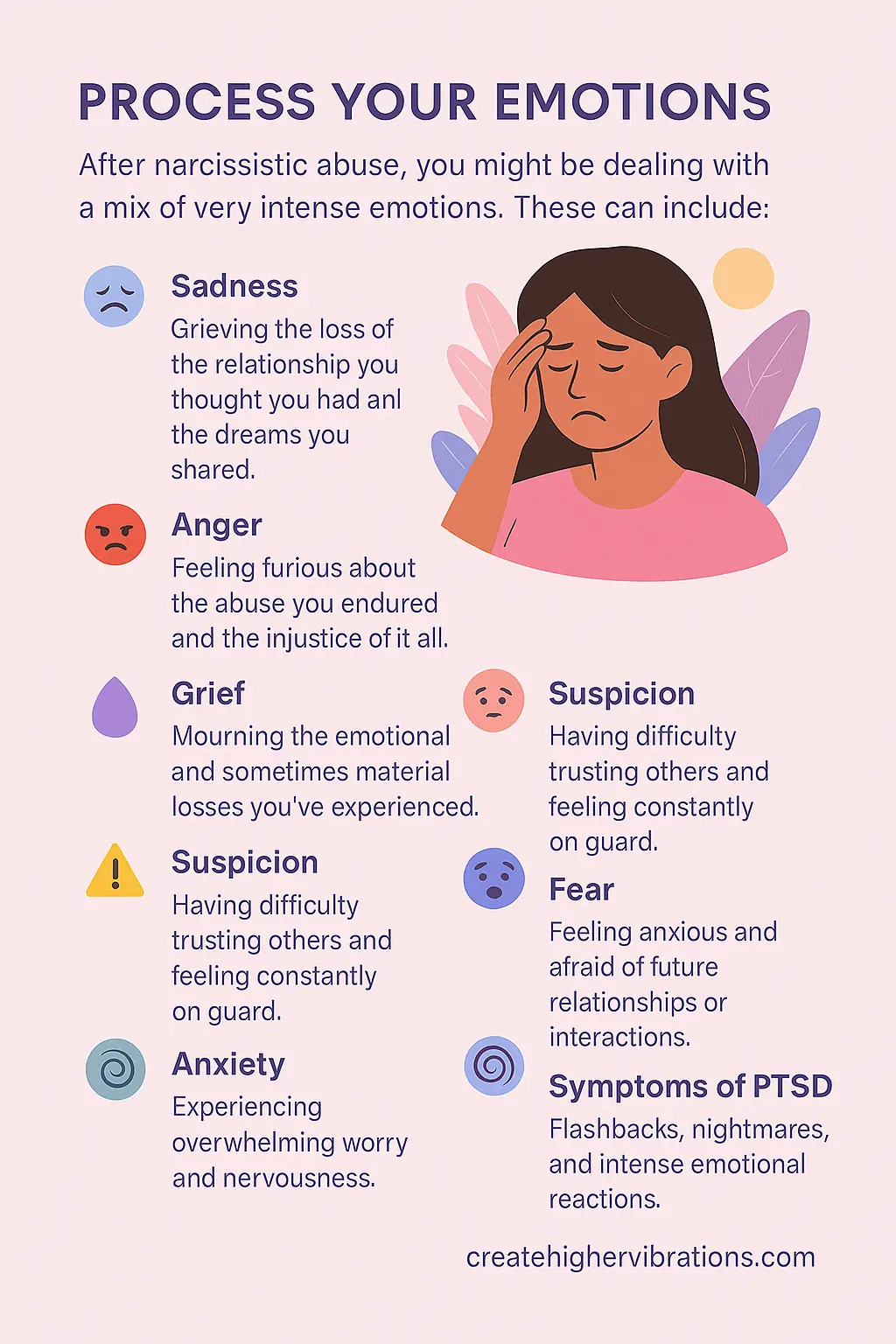A Guide On How To Recover From Narcissistic Abuse

Recovering from narcissistic abuse takes time, but it’s possible, and it starts with awareness. The impact runs deep, affecting your confidence, sense of reality, and emotional well-being.
In this post, you’ll explore stages that can help you recover from narcissistic abuse. Each one offers a step toward rebuilding your sense of self and learning how to move forward without carrying the weight of the past.
You don’t need to rush. You just need a place to start.
Recognizing the Signs and Patterns of Narcissistic Abuse
To heal from narcissistic abuse, you first need to understand what it is and how to spot it. Narcissistic abuse is not just about someone being a little selfish or full of themselves. It’s a pattern of behavior meant to control and harm you emotionally.
People who do this often have a narcissistic personality disorder (NPD). Sometimes, they might even have sociopathic traits. This means they might not care about your feelings and only think about themselves.
At first, a narcissistic person might seem perfect. They might be charming, and loving, and make you feel special. But this is often a trick. Over time, their true colors will show. They will start to manipulate you to get what they want.
Here are some common signs of narcissistic abuse:
It’s important to remember that narcissistic abuse is about power and control. The abuser wants to feel superior and in charge, and they do this by putting you down and manipulating you.

Narcissism vs. Sociopathy
Sometimes people confuse narcissism with sociopathy. While there are some overlaps, they are not the same.
Narcissistic Personality Disorder (NPD) is a mental health condition where people have an inflated sense of their own importance. They need constant attention and admiration and lack empathy for others. They believe they are special and should be treated as such. Underneath this grandiosity is often a fragile self-esteem.
Sociopathy, also known as antisocial personality disorder, is more severe. Sociopaths also lack empathy, but they are also more likely to be deceitful, manipulative, and even engage in criminal behavior. They have no conscience and feel no guilt or remorse for their actions.
Here’s a simple way to think about it:
While both can be abusive, sociopathy often involves more extreme and dangerous behaviors. However, narcissistic abuse is still very damaging and can have serious long-term effects.
Long-Term Effects of Narcissistic Abuse
Narcissistic abuse isn’t just hurtful in the moment. It can leave deep scars that last for a long time. The effects of this type of abuse can range from mild to very serious. It affects your mind, your body, and your overall well-being.
Psychological Effects:
Physical Effects:
It’s important to understand that “narcissistic abuse can shatter a person’s self-confidence, distort their reality, and undermine their other relationships. Recovery means rebuilding your self-worth and reclaiming trust in your voice.” – ELLE MARKMAN, PSYD, MEDICAL EXPERT BOARD. This quote highlights the profound damage this type of abuse can cause to your sense of self.
The effects of narcissistic abuse can be so severe that they increase the risk of developing other mental health disorders and even suicidal thoughts. As research shows,
“While the abuse itself isn’t directly causing death, the long-term effects can lead to various potential life-threatening behaviors such as substance use disorder. People who have endured narcissistic abuse also have an increased risk for suicide due to depression and anxiety”.
This is a serious issue, and it’s crucial to seek help if you are experiencing these effects.
Subscribe to Create Higher Vibrations!
Get Inspiration and Practical advice straight to your inbox.
Essential Steps to Recover From Narcissistic Abuse
Healing from narcissistic abuse is a journey. It takes time and effort, but it is possible to recover and build a healthier, happier life. It’s like climbing a mountain – it might seem hard at first, but with each step, you get closer to the top.
Acknowledge the Abuse
The first step in healing is to acknowledge that you were in an abusive relationship. This might seem obvious, but it can be very difficult, especially because narcissistic abusers are masters of manipulation and gaslighting. They make you doubt yourself and question your reality.
As experts say, “Acknowledging that you were in the relationship and have experienced narcissistic gaslighting is the first step you’ll need to take to start healing from narcissistic abuse.” This acknowledgment is crucial because it validates your experience and allows you to start moving forward.
It can be even harder for children who grew up with narcissistic abuse to recognize it. They might think the abuse was normal because it’s all they’ve ever known. If you grew up in this situation, be patient with yourself as you unpack these experiences.
Set Boundaries
Setting boundaries is essential to protect yourself from further abuse and to start your healing process. Boundaries are like invisible lines that define what is okay and what is not okay in your relationships. Narcissistic abusers are notorious for violating boundaries, so setting and enforcing them is crucial.
“Typically, setting firm boundaries and cutting off contact is recommended at the end of any abusive relationship. Keep in mind that the no-contact rule goes both ways.” This means limiting or completely cutting off contact with the abuser is often the best way to protect yourself.
The “no-contact” rule means stopping all communication with the abuser. This includes phone calls, texts, emails, social media, and even seeing them in person.
This can be very hard, especially if you have been in a long-term relationship or have children together. But it’s often necessary to break free from the cycle of abuse.

Sometimes, no contact is not possible. For example, you might have to co-parent with a narcissistic ex-partner or deal with a narcissistic family member. In these cases, you need to set very specific boundaries and have consequences for when those boundaries are crossed.
For example, you might decide to only communicate via email about child-related matters and ignore any other attempts at contact. You might also decide to leave immediately if the person starts being verbally abusive.
Setting boundaries is not selfish; it’s self-preservation. It’s about teaching people how you deserve to be treated and protecting your emotional well-being.

Process Your Emotions
After narcissistic abuse, you might be dealing with a mix of very intense emotions. These can include:
It’s important to remember that all of these emotions are valid and normal after narcissistic abuse. Don’t try to push them away or ignore them. Painful emotions have a purpose.
They are signals that something is wrong and needs to be addressed. Allow yourself to feel these emotions without judgment. Let them come and go like waves. Trying to suppress them will only make them stronger in the long run.
Finding healthy ways to process your emotions is key. This could include:
Focus on Yourself
Narcissistic relationships are often all about the narcissist. They demand attention, validation, and control. In the recovery process, it’s time to shift the focus back to you. This is your time to rediscover yourself and prioritize your own needs.
This means taking time for self-care. Self-care is not selfish; it’s essential for your well-being. It’s about doing things that nourish your mind, body, and soul. Examples of self-care practices include:
Remember that change takes time, and healing is a process. Be patient and kind to yourself. There will be good days and bad days. Celebrate your progress, no matter how small it may seem. Every step you take towards healing is a victory.
Understanding Forgiveness
Forgiveness is a complex topic, especially when it comes to narcissistic abuse. Many survivors feel pressure to forgive their abusers, often from well-meaning friends or family.
However, it’s important to understand that forgiveness is optional, especially when the abuser has not taken responsibility for their actions or shown any remorse.
True forgiveness is about releasing resentment and anger for your own sake, not for the abuser’s benefit. It’s about freeing yourself from the emotional burden of holding onto pain.
It does not mean condoning the abuse or forgetting what happened. It also doesn’t mean you have to reconcile with the abuser or let them back into your life.
In the context of narcissistic abuse, self-forgiveness is often more important than forgiving the abuser. You might feel shame or self-blame for staying in the relationship or for not recognizing the abuse sooner.
It’s crucial to forgive yourself for these things. You were manipulated, and you did the best you could with the information and resources you had at the time.
Forgiving yourself is about letting go of self-criticism and embracing self-compassion. Treat yourself with the same kindness and understanding you would offer a friend who has been through a similar experience.

The Importance of Professional Support in Healing
Healing from narcissistic abuse is a challenging journey, and you don’t have to do it alone. Professional help is incredibly beneficial due to the deep trauma and long-term effects of this type of abuse.
A trained mental health professional can provide the support, guidance, and tools you need to recover.
As experts emphasize, “When you are dealing with narcissistic abuse, it is essential that you look for professional help; they have the knowledge and experience to help you heal, and you do not have to do this alone.
” Seeking professional help is a sign of strength, not weakness. It shows that you are committed to your healing and well-being.
Clinicians specializing in Cognitive Behavioral Therapy (CBT) and personality disorders are often best equipped to help survivors of narcissistic abuse. They understand the dynamics of narcissistic abuse and can provide effective therapies to address the trauma and its effects.
Types of Therapy
Several types of therapy can help heal from narcissistic abuse:
A therapist can provide a safe and supportive space for you to process your emotions, understand the abuse you experienced, and develop healthy coping strategies.
They can also help you rebuild your self-esteem, set healthy boundaries, and develop healthier relationship patterns in the future. (I suggest a therapist who has experienced this abuse over one who hasn’t)
Building Your Support Network: Social Connectedness
Narcissistic abuse can be incredibly isolating. Abusers often try to cut you off from your friends and family to increase their control. In recovery, rebuilding your support network and fostering social connectedness is vital.
Social connectedness helps people become more gaslight and narcissism-resistant, manage grief, and grow into their authentic selves. When you are surrounded by supportive and understanding people, you are less likely to doubt yourself or fall back into old patterns.
If you have been isolated, you might need to build a new support system. This could involve:
Having a strong support network is like having a safety net. It provides emotional support, practical advice, and a sense of belonging. It reminds you that you are not alone and that there are people who care about you and want to help you heal.
Respite Care: Taking a Break
People in narcissistic relationships often feel obligated to constantly validate and care for the narcissist’s needs. This can be exhausting and draining. Respite care, in this context, means intentionally taking breaks from the demands of recovery and the aftermath of abuse.
People in narcissistic relationships need breaks from the constant validation and caregiving they feel obligated to provide. This “respite” is about prioritizing your own needs for rest, relaxation, and rejuvenation.
Respite care can look different for everyone. It might involve:
Craft your own respite experiences that nourish your soul and help you recharge. Remember, taking breaks is not a sign of weakness; it’s a necessary part of self-care and healing. It allows you to come back to your recovery journey with renewed energy and focus.
Final Thoughts
If you’re moving through the stages of healing after narcissistic abuse, know that it’s okay to take your time. Healing doesn’t follow a set schedule. Give yourself permission to go slow and treat yourself with patience and care.
If things feel heavy, don’t carry it alone. Talk to someone you trust, a therapist, a friend, or someone who understands what you’re facing. You can also find support in online communities where others share similar experiences.
And if you’re still in an abusive relationship, please don’t wait. Your safety and well-being matter. Reaching out is not weakness, it’s strength. You’re not alone, and you don’t have to keep enduring pain in silence.


